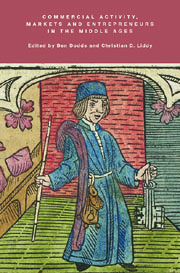 Commercial Activity, Markets and Entrepreneurs in the Middle Ages
Commercial Activity, Markets and Entrepreneurs in the Middle Ages Book contents
- Frontmatter
- Contents
- List of Figures
- List of Tables
- List of Contributors
- List of Abbreviations
- Richard Britnell: An Appreciation
- 1 Unreal Wages: Long-Run Living Standards and the ‘Golden Age’ of the Fifteenth Century
- 2 Minimum Wages and Unemployment Rates in Medieval England: The Case of Old Woodstock, Oxfordshire, 1256–1357
- 3 Crisis Management in London's Food Supply, 1250–1500
- 4 Grain Shortages in Late Medieval Towns
- 5 Market Regulation in Fifteenth-Century England
- 6 Self-Government in the Small Towns of Late Medieval England
- 7 Marketing and Trading Networks in Medieval Durham
- 8 Peasant Opportunities in Rural Durham: Land, Vills and Mills, 1400–1500
- 9 The Shipmaster as Entrepreneur in Medieval England
- 10 Cheating the Boss: Robert Carpenter's Embezzlement Instructions (1261×1268) and Employee Fraud in Medieval England
- 11 The Public Life of the Private Charter in Thirteenth-Century England
- 12 Luxury Goods in Medieval England
- Index of People and Places
- Bibliography of the Writings of Richard Britnell
- Tabula Gratulatoria
2 - Minimum Wages and Unemployment Rates in Medieval England: The Case of Old Woodstock, Oxfordshire, 1256–1357
Published online by Cambridge University Press: 05 February 2013
- Frontmatter
- Contents
- List of Figures
- List of Tables
- List of Contributors
- List of Abbreviations
- Richard Britnell: An Appreciation
- 1 Unreal Wages: Long-Run Living Standards and the ‘Golden Age’ of the Fifteenth Century
- 2 Minimum Wages and Unemployment Rates in Medieval England: The Case of Old Woodstock, Oxfordshire, 1256–1357
- 3 Crisis Management in London's Food Supply, 1250–1500
- 4 Grain Shortages in Late Medieval Towns
- 5 Market Regulation in Fifteenth-Century England
- 6 Self-Government in the Small Towns of Late Medieval England
- 7 Marketing and Trading Networks in Medieval Durham
- 8 Peasant Opportunities in Rural Durham: Land, Vills and Mills, 1400–1500
- 9 The Shipmaster as Entrepreneur in Medieval England
- 10 Cheating the Boss: Robert Carpenter's Embezzlement Instructions (1261×1268) and Employee Fraud in Medieval England
- 11 The Public Life of the Private Charter in Thirteenth-Century England
- 12 Luxury Goods in Medieval England
- Index of People and Places
- Bibliography of the Writings of Richard Britnell
- Tabula Gratulatoria
Summary
Many might consider a discussion of minimum wages and unemployment rates in the Middle Ages as hopelessly anachronistic. Certainly medieval people would probably have had considerable trouble in understanding what either of these concepts meant. Unemployment rates — the percentage of the total available workforce who are not employed — would certainly puzzle them. In their minds, everyone, even the habitually lazy, would be put to work for family and community, especially at busy times like the harvest. Minimum wages in the way we think of them today would likely have been no easier for them to understand. Certainly, when state attempts to regulate wages were made in the Middle Ages, as after the advent of the Black Death, it was to set a ceiling on wages, not to bring them up to a certain level.
Yet medieval authorities undoubtedly did have a sense at any particular moment of what might comprise a basal or lowest level wage for both skilled and unskilled labour and would also have a sense, although certainly a more vague one, of the current availability of that labour. As a surrogate for these almost instinctively held notions, then, it might be useful, despite the dangers of anachronism, to apply modern concepts such as minimum wages and unemployment rates as conceptual aids for achieving a better understanding of waged labour in the Middle Ages. Unfortunately, most of the work done on medieval wages, from Thorold Rogers onwards, has tended to be unhelpful for establishing such things as basal wages, either because of the focus on average wages, as discussed below, or because of a greater emphasis on elite workers, such as craftsmen.
- Type
- Chapter
- Information
- Commercial Activity, Markets and Entrepreneurs in the Middle AgesEssays in Honour of Richard Britnell, pp. 25 - 44Publisher: Boydell & BrewerPrint publication year: 2011


